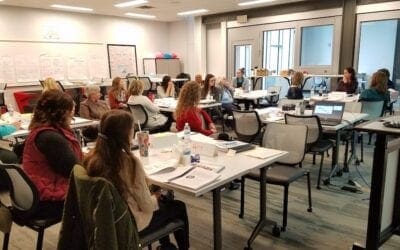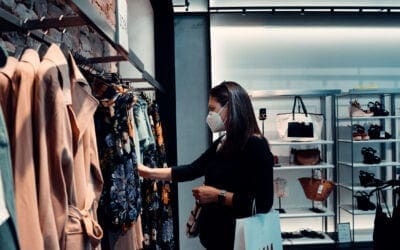Reducing Frontline Workers’ Risk of COVID-19

NOTE: This COVID-19 post is over a year old and may contain outdated information. It has been left up for archival purposes only. For the most up-to-date information on masking, vaccines, and more, visit the CDC’s website.
The COVID-19 pandemic has been a stressful time for many, especially those who work on the frontlines. Frontline and essential workers provide our community with much-needed medical and protective services and help ensure access to resources such as food, medication, electricity, sanitation services, and more.
Frontline and essential workers have shown up, exposing themselves to hundreds, if not thousands of people each day, to keep our country functioning throughout the pandemic. Because of the nature of their work, this sector of the workforce is at a higher risk of contracting COVID-19.
How Frontline Workers Can Reduce Their Risk
Frontline workers can reduce their risk of COVID-19 transmission by knowing how it spreads and routinely implementing best practices.
COVID-19 is a respiratory illness that spreads through respiratory droplets when an infected person coughs, sneezes, sings, talks, or breathes. An exposure occurs if you are within 6 feet of an infected person for 15 cumulative minutes or more. In general, the more closely you interact with others, and the longer that interaction, the higher the risk of COVID-19 spread. If you notice someone is coughing or sneezing, it’s best to limit close, extended contact with them.
Here are some tips for reducing the risk of COVID-19 at work:
- Stay home if you are feeling sick. If you notice a coworker is starting to feel symptoms, encourage them to go home
- Keep a mask, tissues, and hand sanitizer with at least 60% alcohol on-hand throughout your shift
- Wear a mask over your mouth and nose
- Maintain at least 6 feet of distance between yourself and others
- Wash your hands often with soap and water for at least 20 seconds or use hand sanitizer with at least 60% alcohol frequently
- Avoid touching your eyes, nose, and mouth if you haven’t washed your hands
- Cover your coughs and sneezes and immediately wash or sanitize your hands afterward
- Clean and disinfect frequently touched objects and surfaces, like workstations, keyboards, telephones, handrails, and doorknobs
- Avoid using other employees’ phones, desks, offices, or other work tools and equipment, when possible. If you cannot avoid it, make sure to disinfect before and after use
- Wash your hands before taking off or putting on your mask
Resources for Healthcare Workers
Healthcare workers are well equipped with personal protective gear to protect themselves from COVID-19 transmission. However, they may be dealing with burnout or mental health burden from the pandemic. Mental Health America has an array of resources for medical workers who are dealing with fatigue, burnout, trauma, stress, or frustration.
What the Community Can Do To Help
The community can help keep frontline and essential workers safe by helping to reduce the spread of COVID-19. This entails staying home if you are sick, wearing a mask when interacting with people who do not live in your household, washing your hands frequently, keeping a safe distance, and covering your coughs and sneezes.
By working together, we can reduce the spread of COVID-19 and keep healthcare workers, grocery store clerks, sanitation workers, food service staff, teachers, protective service members, tradespeople, transportation workers, utility workers, and more safe while they work to keep us going.
Archives
- February 2026 (1)
- December 2025 (1)
- November 2025 (2)
- September 2025 (1)
- July 2025 (2)
- June 2025 (3)
- April 2025 (2)
- January 2025 (2)
- December 2024 (1)
- September 2024 (2)
- August 2024 (2)
- July 2024 (1)
- June 2024 (1)
- February 2024 (1)
- July 2023 (1)
- March 2023 (1)
- October 2022 (1)
- September 2022 (1)
- August 2022 (1)
- July 2022 (2)
- June 2022 (2)
- May 2022 (1)
- April 2022 (4)
- March 2022 (1)
- February 2022 (1)
- January 2022 (1)
- December 2021 (4)
- November 2021 (3)
- September 2021 (2)
- August 2021 (3)
- July 2021 (2)
- June 2021 (1)
- May 2021 (2)
- March 2021 (1)
- December 2020 (6)
- November 2020 (8)
- October 2020 (4)
- September 2020 (7)
- August 2020 (3)
- July 2020 (11)
- May 2020 (2)
- April 2020 (4)
- March 2020 (1)
Categories
- Communicable Disease (5)
- Clinical Services (19)
- Clinical Servcies (1)
- Health Promotions (74)
- Emergency Preparedness (8)





